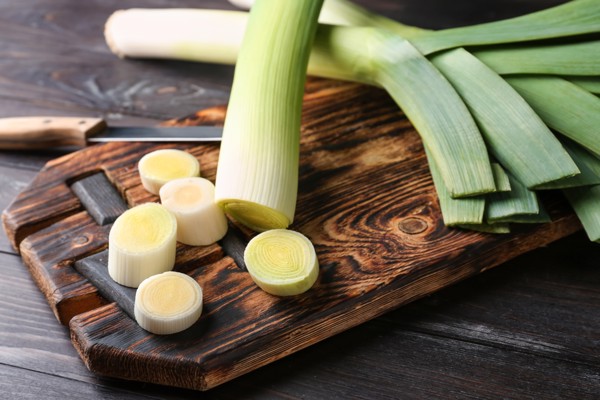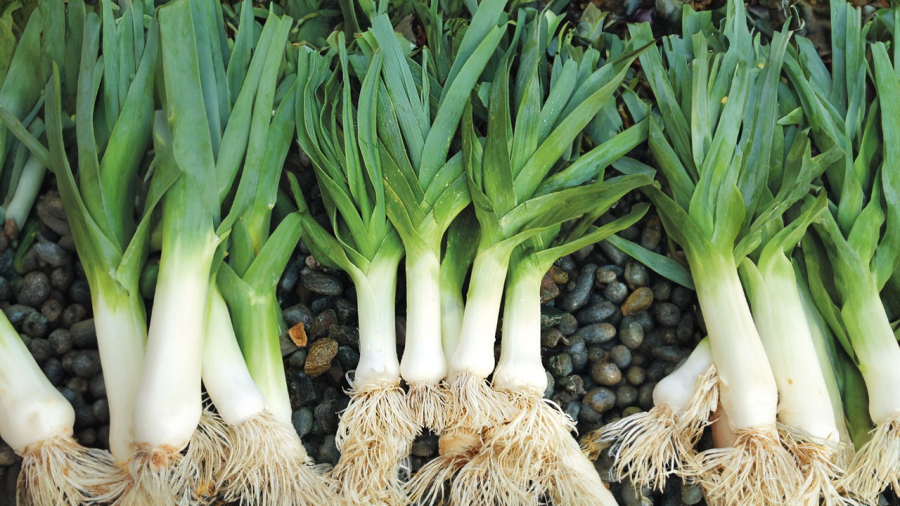Leek, also known as baro onions, is closely related to chives, garlic, and onions. At first glance, leeks resemble a giant scallion but have a milder, slightly sweet flavor. This herbaceous vegetable brings many health benefits.
Nutritional value of leeks
Leeks are rich in vitamins and minerals but have a low calorie content. They contain vitamins A, K, C, E, folate, iron, calcium, copper, magnesium, manganese, phosphorus, selenium, zinc, sodium, potassium, carotenoids, and Lutein-zeaxanthin.

Benefits of leeks
Reducing inflammation and good for cardiovascular health
Leeks contain beneficial compounds that help reduce inflammation and protect cardiovascular health. For example, kaempferol is an anti-inflammatory compound. Additionally, foods containing kaempferol are associated with reducing the risk of heart attack or death from heart disease.
Furthermore, allicin and other thiosulfinate compounds in leeks are sulfur-containing compounds that reduce cholesterol, lower blood pressure, and decrease the risk of blood clot formation, benefiting cardiovascular health.
Fighting against certain types of cancer
Kaempferol in leeks has anti-inflammatory properties, which can help kill cancer cells and prevent their spread.
Abundant allicin in leeks is not only good for cardiovascular health but also considered to have anti-cancer properties. Research suggests that consuming allium vegetables, including leeks, may reduce the risk of stomach and colorectal cancers.

Beneficial for the urinary system
Thanks to their soluble fiber content, including prebiotics, leeks are good for the digestive system. This fiber helps maintain a healthy gut, reduce inflammation, and support the body in absorbing important nutrients.
Aiding in weight loss
Leeks can effectively support the weight loss process. Boiled leeks contain only 31 calories per 100 grams. Additionally, leeks are a good source of water and fiber, which can prevent hunger, keep you feeling full for longer, and help you eat less, thus supporting weight loss.
Furthermore, leeks also provide soluble fiber, which forms a gel in the intestine and is particularly effective in reducing the feeling of hunger and cravings.

Beneficial for pregnant women
Leeks are a good source of folate, making them beneficial for pregnant women. This nutrient is essential for preventing miscarriages and neural tube defects, which are abnormalities in the development of the brain and spinal cord of the fetus.
Additionally, allium vegetables also help reduce the risk of spontaneous preterm birth, especially during the period from 28 to 31 weeks. This is particularly important as premature birth can increase the risk of complications for the baby, such as infections, anemia, jaundice, etc.
Antibacterial properties
The significant amount of vitamin A in leeks can support the development of healthy red and white blood cells, transport oxygen, and fight infections.
Additionally, a vegetable related to leeks has been studied for its anti-flu properties. This ability to fight against the flu virus is attributed to the presence of fructans, a type of fructan also found in leeks. This suggests that leeks may have similar anti-flu properties.
In addition to the above benefits, leeks have many other advantages, such as preventing anemia, promoting healthy bones, protecting the eyes from oxidative damage, improving brain function, and reducing blood sugar levels.





































